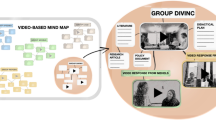Abstract
This project placed elementary preservice teachers in learners' roles while learning to use a literature discussion strategy. The goal of the literature discussion strategy is to go beyond simple recollection of what happened in a story to include discussion that constructs, examines, and analyzes the story for deeper meaning. The purpose of this descriptive study was to explore the extent to which preservice teachers applied the strategy and attained the strategy goal by examining the dialogue that occurred. Twenty-four preservice teachers read and discussed Dear Mr. Henshaw (Cleary, 1983) for two 30 minute time periods. The discussions were audio-taped and transcribed, producing 784 utterances. Analysis was accomplished by sorting the utterances into categories adapted from the analysis categories described by Eeds and Wells (1989). Results indicated that the preservice teachers did apply the strategy from a learner's perspective as it was taught to them and thereby attained the strategy goal.
Similar content being viewed by others
References
Blaine, M. (1975).A terrible thing happened at our house. New York: Scholastic.
Blume, J. (1972).Tales of a fourth grade nothing. New York: Bantam.
Browne, D., & Hoover, J. (1990). The degree to which student teachers report using instructional strategies valued by university faculty.Action in Teacher Education, 12(1), 20–24.
Bryant, J., & Wedman, J. (1994). Instruction in elementary reading methods course: Faculty orientations and strategy use.Reading Horizons, 34, (4), 303–315.
Cleary, B. (1983).Dear Mr. Henshaw. New York: Dell.
Eeds, M., & Wells, D. (1989). Grand conversations: An exploration of meaning construction in literature study groups.Research in the Training of English, 23, 1, 4–29.
Fillmore, C. (1981). Ideal readers and real readers. In D. Tannen (Ed.),Analyzing discourse: Text and talk (pp. 126–138). Washington, DC: Georgetown University Press.
Ginsberg, M., & Clift, R. (1990). The hidden curriculum of preservice teacher education. In R. W. Houston (Ed.),Handbook of research on teacher education (pp. 450–465). New York: Macmillan.
Guyton, E., & McIntyhre, D. J. (1990). Student teaching and school experiences. In R. W. Houston (Ed.),Handbook of research on teacher education (pp. 514–534). New York: Macmillan.
Goodlad, J. I. (1984).A place called school. New York: McGraw Hill.
Goodman, K. (1986).What's whole in whole language?. Portsmouth, NH: Heinemann.
Hao, R. N. (1988). Research and development models for improving reading instruction. In S. J. Samuels and P. D. Pearson (Eds.),Changing school reading programs: Principles and case studies (pp. 95–120). Newark, DE: International Reading Association.
Johnson, J., & Roehler, L. (1989). Teachers' rationales for their adaptive instruction actions: The reasons teachers give for doing what they do. Paper presented the meeting of the National Reading Conference, Austin, TX.
Kelly, R., & Farnan, N. (1990). Practicing what we teach in reading education programs,Journal of Reading, 34, 264–269.
Lortie, D. (1975).Schoolteacher: A sociological study. Chicago: University of Chicago Press.
Packman, L. A. (1991). Do as I say, not as I do — teacher education. In T. V. Rasinski, N. P. Padak, & J. Logan (Eds.),Reading is knowledge. College Reading Association.
Pearson, P. D., & Johnson, D. D. (1978).Teaching reading comprehension. New York: Holt, Rinehart, & Winston.
Peterson, P. L., & Comeaux, M. A. (1987). Teachers' schemata for classroom events: The mental scaffolding of teachers' thinking during classroom instruction.Teaching and Teacher Education, 3, 319–331.
Rikard, G. L., & Beacham, B. (1992). A vision for innovation in preservice teaching: The evaluation of a model program.Action in Teacher Education, 14, (1), 35–41.
Rosenblatt, L. M. (1989). The transactional theory of the literary work: Implications for research. In C. R. Cooper (Ed.),Researching response to literature and the teaching of literature: Points of departure (pp,. 33–53). Norwood, NJ: Ablex Publishing Corporation.
Rumelhart, D. (1985). Toward an interactive model of reading. In H. Singer and R. Rudell (Eds.),Theoretical models and processes of reading, (3rd ed.), Newark, DE: International Reading Assocation.
Samuels, J. S., & Pearson, P. D. (Eds.) (1988).Changing school reading programs. Newark: International Reading Association.
Scharer, P. (1991). Moving into literature-based reading instruction: Changes and challenges for teachers. In J. Zutell and S. McCormick (Ed.),Learner factors/teacher factors: Issues in literacy research and instruction (pp. 409–422). Chicago: National Reading Confernece, Inc.
Tierney, R., & Pearson, P. D. (1983). Toward a composing model of reading.Language Arts, 60, (5), 568–580.
Valli, L. (1992). Beginning teacher problems: Areas for teacher education improvement.Action in Teacher Education, 14, (1), 18–25.
Waber, B. (1972).Ira sleeps over. Boston: Houghton-Mifflin.
Zeichner, K. M. & Gore, J. (1990). Teacher socialization. In R. W. Houston (Ed.),Handbook of research on teacher education (pp. 329–348). New York: Macmillan.
Additional information
Judy M. Wedman received her Ph.D. from the University of Oklahoma. She is an Associate Professor in the Curriculum and Instruction Department at the University of Missouri at Columbia. The focus of her research is related to teacher training in the literacy areas. Nancy L. Smith received her Ph.D. from the University of Missouri at Columbia. She is an Assistant Professor in the Curriculum and Instruction Department at Emporia State University. The focus of her research is related to teacher training in math education. Elizabeth J. Jared received her Ph.D. from the University of Missouri at Columbia. She is an Assistant Professor in the Curriculum and Instruction Department at Utah State University. Her research interests are related to teacher education and literacy education.
Rights and permissions
About this article
Cite this article
Wedman, J.M., Smith, N.L. & Jared, E.J. Demonstrating strategy application and goals from a learner's perspective: Examining preservice teachers' talk during literature discussions. Innov High Educ 19, 139–156 (1994). https://doi.org/10.1007/BF01191594
Issue Date:
DOI: https://doi.org/10.1007/BF01191594




